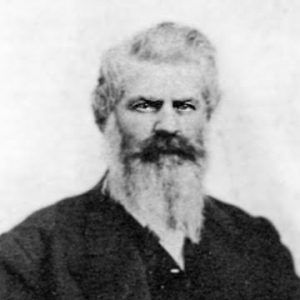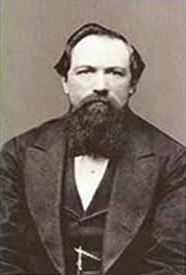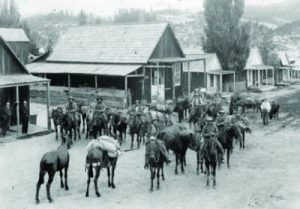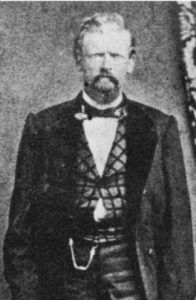
Sumner Pinkham
Sumner Pinkham was born in 1820 in the state of Maine and was raised in Wisconsin. Little is known about his early life. He married Laurinda Maria Atwood on November 4, 1842, in Nebraska.
In 1849, Pinkham joined the California gold rush and then spent time in Oregon before making his way to the booming gold rush camp of Idaho City in 1862.
Pinkham was a powerfully built man who stood six feet two inches tall with a barrel chest and prematurely white hair that aged his appearance beyond his years. He was also a radical Republican, a fervent Unionist, and an ardent abolitionist, which did not sit well with many of the men of the Boise Basin mining camps who were predominantly Democratic.
At the time of his arrival, Idaho was still a part of Washington Territory, and the Boise Basin was located in Idaho County, of which Florence was the county seat. Because Florence was remote from the new mining basin, the Washington Legislature established Boise County on January 29, 1863.
The Governor of Washington assigned commissioners and officers to the newly established county, one of which was Sumner Pinkham, who would serve as the County Sheriff. When Congress created Idaho Territory on March 4, 1863, Boise County exceeded the other counties in both area and in population. Those in office in Boise County, including Sumner Pinkham, retained their positions until the territorial government could be officially organized. In August 1863, Pinkham appointed Orlando “Rube” Robbins, who shared his political opinions, as his deputy. Robbins would later make himself known as one of Idaho’s greatest lawmen.

Orlando “Rube” Robbins
With the Civil War raging in the East, the area miners polarized around the Union and Confederate causes. Fueled by whiskey, Northern and Southern sympathizers often bloodied one another with fists, knives, and sometimes guns as they used force to show their opinions. Many an evening, both Pinkham and his deputy, Rube Robbins, had to lock up a drunken loudmouth who threatened to punch or shoot to demonstrate his political beliefs to an equally intoxicated opponent.
With his staunch Unionist views, Republican politics, and tough law enforcement, Pinkham soon made himself many enemies in the predominantly Democratic Boise County. However, both Pinkham’s enemies and his most loyal friends were quick to admit that he was a man not to be trifled with when he undertook to enforce the law, which he did so with an iron hand.
One of his most fervent enemies was a Southern gunfighter named Ferdinand “Ferd” Patterson. On one occasion, while Patterson was partying with some of his friends in Idaho City, they took unlawful possession of a brewery in Idaho City. The owner called upon Sheriff Sumner Pinkham to do something about it. When Pinkham entered the brewery, he was met with violent resistance. Pinkham and Patterson saw in each other everything they loathed. Patterson was Southerner who was crooked by nature, and Pinkham was a Northerner who tended to be self-righteous. In the end, Pinkham was successful, and Patterson was arrested.
In October 1864, Pinkham was running for re-election as Boise County Sheriff. In a bitter contest between the Democratic successionists and Republican candidates, Pinkham was defeated by A.O. Bowen by a comfortable majority.
As the last of the ballots were being counted, Ferd Patterson celebrated when he encountered his old nemesis Sumner Pinkham, who was in a rage. Wasting no time, the lawman swung at Patterson, hitting him in the jaw and throwing the gambler off the street and into the gutter. Then Pinkham walked away. Locals expected immediate retaliation from Patterson, but it did not occur.
After losing the election, Sumner left Idaho City to visit his dying mother in Illinois. When he returned in 1865, the locals immediately began to speculate that Ferd Patterson and Sumner Pinkham would have it out.

Historic Idaho City, Idaho
After the Civil War’s end, Sumner Pinkham staged a gala Fourth of July party. The crowds were mostly festive, with fireworks blazing and booze flowing. The celebration included a brass band, speeches, patriotic songs, a picnic, and a parade with Sumner Pinkham leading the way through town. For the victorious Yankees, it was a proud day. But, for the sullen Confederate sympathizers, it was not so much, and they heckled the “Blue Bellies” throughout the day. For Patterson, seeing Pinkham leading the parade was a further stab at his southern loyalties.
Pinkham was singing, “Oh, we’ll hang Jeff Davis to a sour apple tree!” when Ferd Patterson yelled out to the ex-sheriff that if he didn’t shut his mouth, he’d shut it for him. Pinkham invited him to try, and he did. A brief scuffle between the two men resulted in the flag falling into the dust of the street. Some witnesses swore they saw Ferd Patterson spit on it, and others attested they heard Pinkham swear he would kill Patterson for that.
Several weeks later, on Sunday, July 23, Sumner Pinkham took a hired carriage from Idaho City to the Warm Springs Resort about two miles west of town. Upon his arrival, Pinkham joined a number of his Unionist friends in the saloon, where they were heard singing patriotic and anti-Confederate songs.

Ferd Patterson
Sometime later, Ferd Patterson entered the resort while Pinkham was paying his bill. Initially, Patterson ignored Pinkham, but by the time the ex-sheriff exited the resort, Ferd was outside waiting for him. Here, witnesses reported they heard Patterson say the word “draw” and then taunted Pinkham by calling him an “Abolitionist son-of-a-bitch.” Who drew first was in dispute, but in the end, Pinkham was dead.
Patterson quickly fled but was immediately followed by several lawmen. The first to catch up with the killer was Rube Robbins, who was now a civilian. Robbins found Patterson on the road to Boise, about 14 miles from Idaho City. Patterson immediately surrendered to Robbins, who turned the killer over to Sheriff A.O. Bowen, who was next on the scene. Bowen and his men took over and escorted Patterson back to Idaho City.
When the lawmen and their prisoner arrived, they were met with a mob bent on lynching the killer, but the lawmen outwitted them and got their prisoner safely into the jail. At that time, the town jail, the first in the Idaho region, was on an acre of ground surrounded by a stockade. The mob swarmed outside the stockade continuing to threaten Patterson, but the lawmen defended the stronghold with a cannon thrust through portholes in the protecting fence.
In the meantime, Sumner’s funeral was held, which was the largest and most impressive ever seen in the mining camp. It was reported that over 1,500 mourners followed his hearse to the graveyard.
William J. McConnell, who would later organize the Payette Valley Vigilantes and become a senator and governor of Idaho, described ex-Sheriff Sumner Pinkham as “one of Nature’s noblemen, six feet two inches tall, with the frame of an athlete … not only physically but mentally he was a leader among men … marked from the first for the bullet of an assassin.”
The sight of the immense number of mourners gave formerly reluctant men to take the law into their own hands. No vigilante committee yet existed in the Boise Basin but now, responsible men were openly suggesting that an organization of the righteous was the only way to clean up the country.
Ferd Patterson was tried for Pinkman’s murder at the beginning of November 1865. In the six-day trial, defense attorney Frank Ganahl claimed his client acted in self-defense, arguing that Pinkham was laying in wait for him. Alternatively, Pinkham’s friends testified that he tried to avoid a showdown and that Patterson came to Warm Springs with the explicit purpose of murdering Pinkham.
It took only an hour and a half for the jury to acquit Patterson.
On November 16, the Oregon newspaper reported:
This ruffian has gone through the farce of a trial by a jury of fellow “Democrats” at Idaho City and of course, has been acquitted. No other verdict was anticipated by those who know the character of Patterson and his associates in Idaho.”
The Idaho Statesman wrote:
Ferd Patterson has been acquitted, as expected. Idaho juries do not inquire whether a crime has been committed. All they ask is: “Was it a fair fight?” If so, they cry: “Not guilty!”
Knowing he was in extreme danger, Ferd Patterson quickly fled Idaho City after his acquittal. He was killed in Walla Walla, Washington, the next year.
© Kathy Alexander/Legends of America, updated November 2022.
Also See:
Ferd Patterson – Living and Dying by the Gun
Idaho City – Queen of the Boise Basin
Sources:
Bancroft, Hubert Howe; The Works of Hubert Howe Bancroft, Volume 31; History Company, British Columbia,1890
Gulick, Bill; Outlaws of the Pacific Northwest, Caxton Press, 2000
Ferd Patterson – Legends of America
